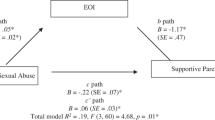Abstract
Introduction
Evidence suggests that mothers are negative and critical when talking about their children with behaviour problems. However the association with specific types of behaviour problems and the influence of both child and adult psychopathology on these relationships require further clarification.
Methods
Speech samples were gathered from mothers of 100 school-aged boys and coded using standard Expressed Emotion (EE) categories. Levels of maternal and child psychopathology were ascertained using standardised questionnaires completed by the mother.
Results
There were significant and positive correlations between criticism and child ADHD, conduct and emotional symptoms respectively. There were also significant and negative correlations between EOI and child ADHD and conduct problems.
Conclusions
The findings of the current study suggest that when considered together EE is driven more by the child rather than by maternal characteristics and these effects are specific to conduct and emotional problems. The implications of the findings are discussed.
Similar content being viewed by others
References
Asarnow J, Tompson M, Hamilton E, Goldstein M, Guthrie D (1994) Family expressed emotion, childhood-onset depression, and childhood-onset schizophrenia spectrum disorders: Is expressed emotion a nonspecific correlate of child psychopathology or a specific risk factor for depression? J Abnor Child Psychol 22:129–146
Barkley R (1989) Attention-deficit hyperactivity disorder. In: Mash E, Barkley R (eds) Treatment of childhood disorders. New York: Guildford Press, pp 39–72
Barkley R, Karlsson J, Pollard S, Murphy J (1985) Developmental changes in the mother-child interactions of hyperactive boys: Effects of two dose levels of Ritalin. J Child Psychol Psychiatry 26:705–715
Barkley R, Murphy K (1998) Attention deficit hyperactivity disorder: a Clinical Workbook. Guildford, New York
Bryant F, Smith B (2001) Refining the architecture of aggression: a measurement model for the Buss-Perry Aggression Questionnaire. J Res Personal 35:138–167
Daley D, Sonuga-Barke E, Thompson M (2003) Assessing expressed emotion in mothers of preschool AD/HD children: psychometric properties of a modified speech sample. Brit J Clin Psychol 42:53–67
Eddy J, Dishion T, Stoolmiller M (1998) The analysis of intervention change in children and families: methodological and conceptual issues embedded in intervention studies. J Abnorm Child Psychol 26:53–71
Goldberg D (1982) General health questionnaire manual. Windsor, NFER
Goodman R (1997) The strengths and difficulties questionnaire: a research note. J Child Psychol Psych Allied Disciplin 38:581–586
Hibbs E, Hamburger S, Lenane M, Rapoport J, Kruesi M, Keysor C, Goldstein M (1991) Determinants of expressed emotion in families of disturbed and normal children. J Child Psychol Psychiat 32:757–770
Hirshfeld D, Biederman J, Brody L, Faraone S, Rosenbaum J (1997) Associations between expressed emotion and child behavioural inhibition and psychopathology: a pilot study. J Am Acad Child Adol Psychiat 36:205–212
Hirshfeld D, Biederman J, Faraone S, Rosenbaum J (1997) Expressed emotion toward children with behavioral inhibition: associations with maternal anxiety disorder. J Am Acad Child Adol Psychiat 36:910–917
Hooley J, Hiller J (2000) Personality and expressed emotion. J Abnorm Psychol 109:40–44
Lovejoy M, Graczyk P, O’Hare, Neuman G (2000) Maternal depression and parenting behaviour: a meta-analytic review. Clin Psychol Rev 20:561–592
Magana A, Goldstein M, Karno M, Miklowitz D, Jenkins J, Falloon I (1986) A brief method for assessing expressed emotion in relatives of psychiatric patients. Psychiatric Res 17:203–212
Murray C, Johnston C (2006) Parenting in mothers with and without attention deficit/hyperactivity disorder. J Abnorm Psychol 115:52–61
Patterson G (1982) Coercive family process. Castalia, Eugene, OR
Pelham W, Lang A, Atkeson B, Murphy D, Gnagy E, Greiner A, Wodde-Hamilton M, Greenslade K (1997) Effects of deviant child behavior on parental distress and alcohol consumption in laboratory interactions. J Abnorm Child Psychol 25:413–424
Peris T, Baker B (2000) Applications of the expressed emotion construct to young children with externalising behavior: stability and prediction over time. J Child Psychol Psychiat 41:457–482
Richters J (1992) Depressed mothers as informants about their children: a critical review of the evidence for distortion. Psycholog Bull 112:485–499
Rothbaum F, Weisz J (1994) Parental caregiving and child externalizing behavior in nonclinical samples: a meta-analysis. Psycholog Bull 116:55–74
Schreiber J, Breier A, Pickar D (1995) Expressed emotion. Trait or state? Brit J Psychiat 166:647–649
Schwartz C, Dorer D, Beardslee W, Lavori P, Keller M (1990) Maternal expressed emotion and parental effective disorder: risk for childhood depressive disorder, substance abuse, or conduct disorder. J Psychiat Res 24:231–250
Stubbe D, Zahner G, Goldstein M, Leckman J (1993) Diagnostic specificity of a brief measure of expressed emotion: A community study of children. J Child Psychol Psychiat 34:139–154
Wamboldt F, O’Connor S, Wamboldt M, Gavin L, Klinnert M (2000) The 5 min speech sample in children with asthma: deconstructing the construct of expressed emotion. J Child Psychol Psychiat 41:887–898
Weisz J, Weiss B (1991) Studying the “referrability” of child clinical problems. J Consult Clin Psychol 59:266–273
Author information
Authors and Affiliations
Corresponding author
Rights and permissions
About this article
Cite this article
Psychogiou, L., Daley, D.M., Thompson, M.J. et al. Mothers’ expressed emotion toward their school-aged sons. Eur Child Adolesc Psychiatry 16, 458–464 (2007). https://doi.org/10.1007/s00787-007-0619-y
Accepted:
Published:
Issue Date:
DOI: https://doi.org/10.1007/s00787-007-0619-y




